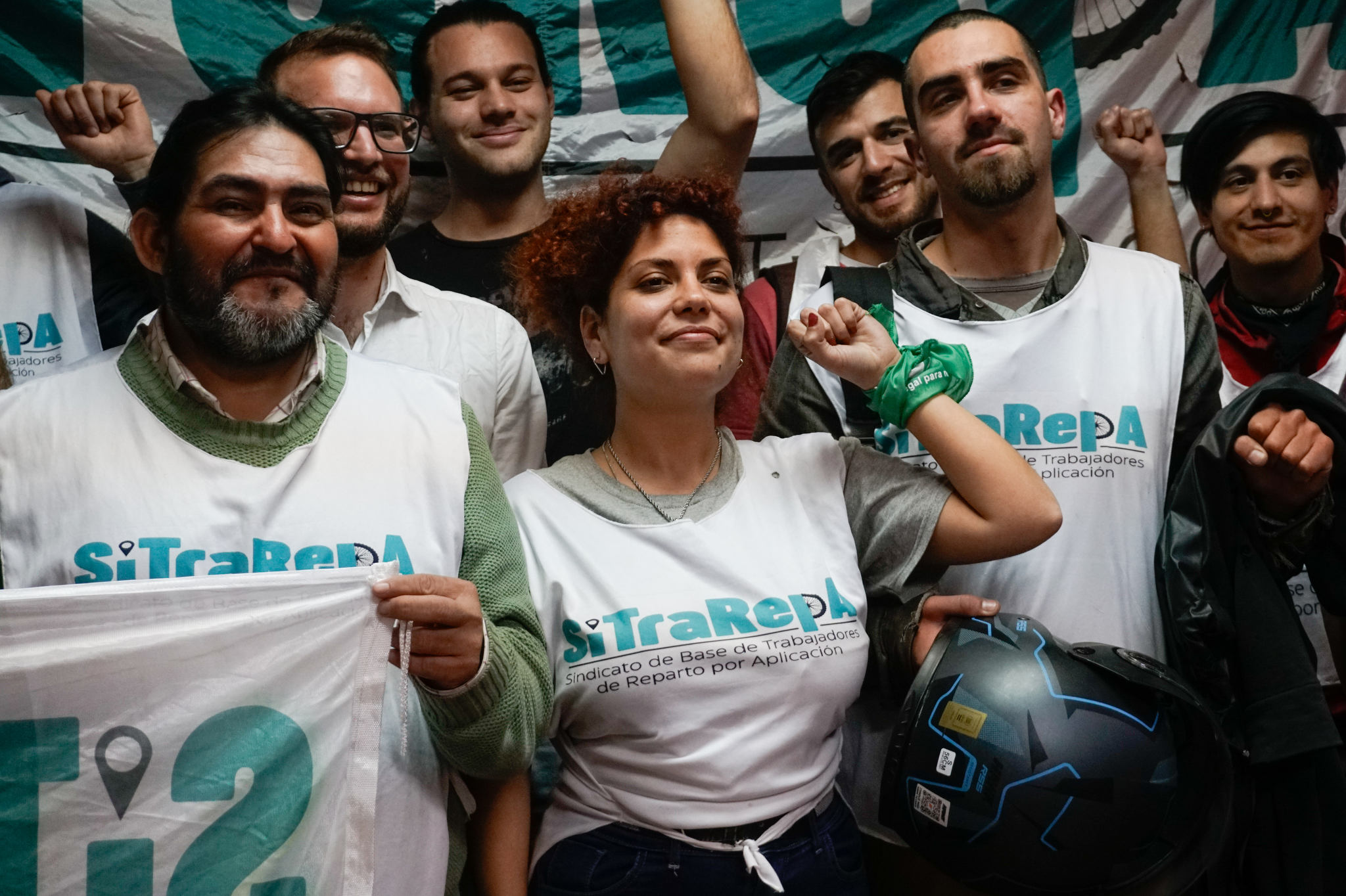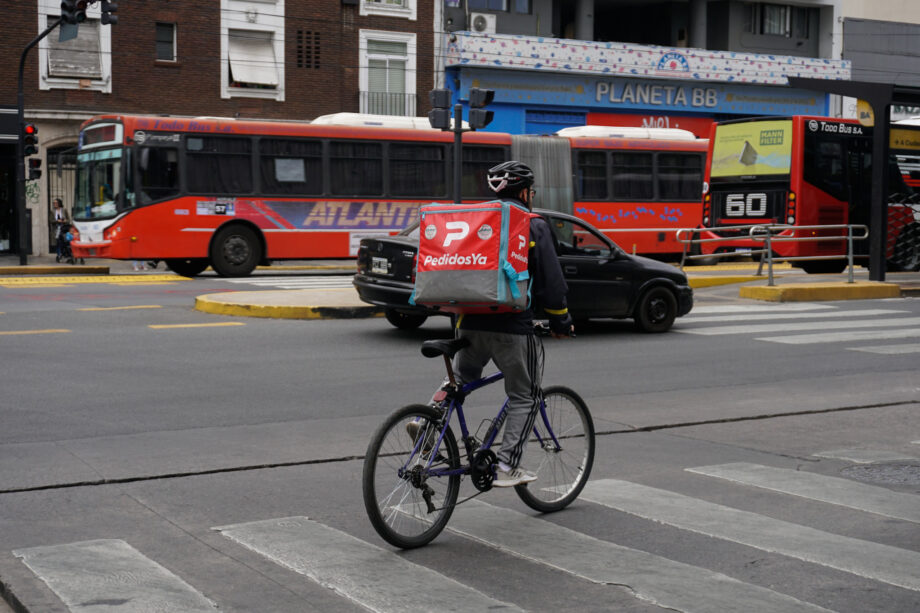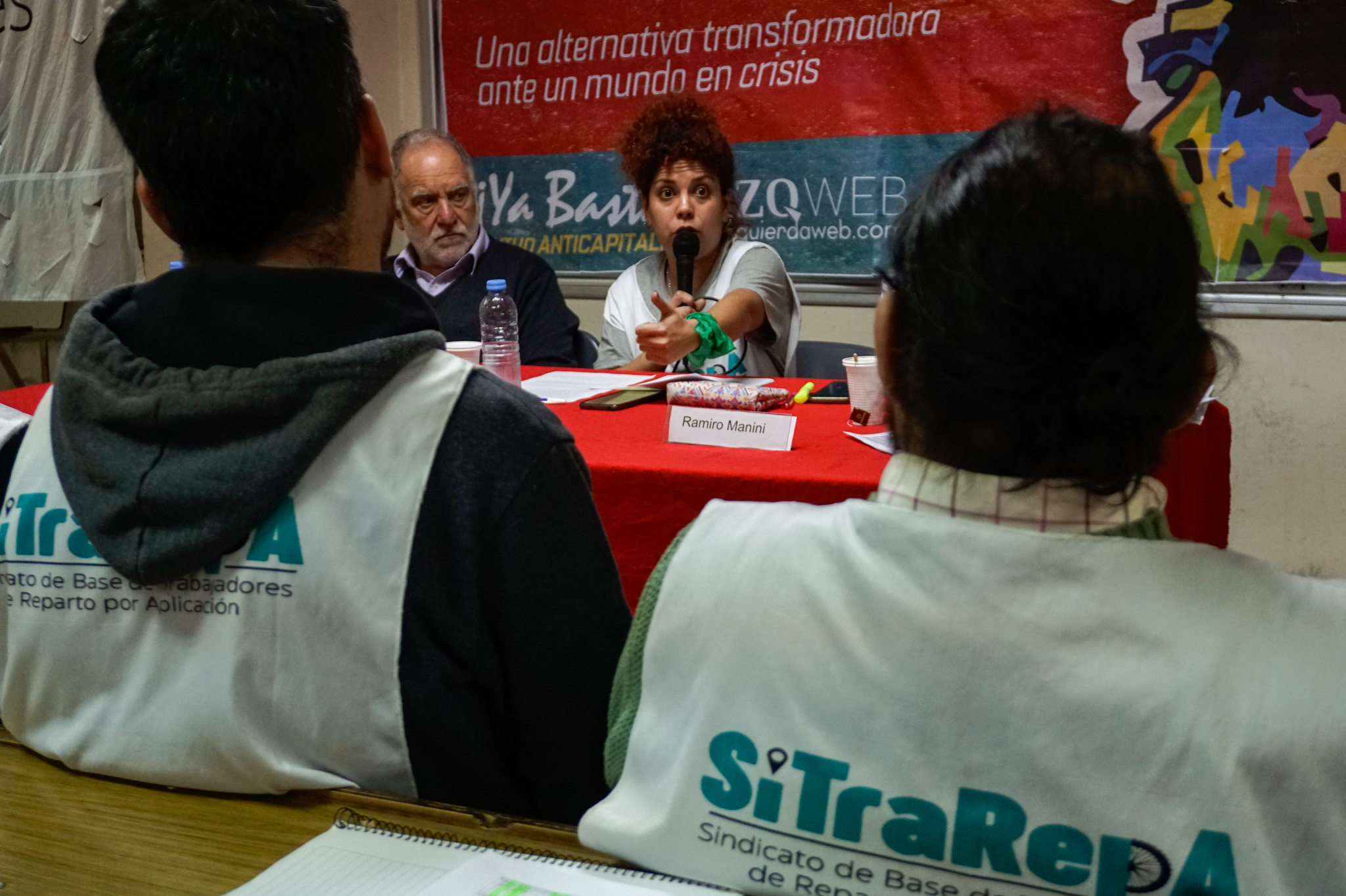
Lucila Pellettieri, GPJ Argentina
Belén d’Ambrosio, center, the assistant secretary of Sindicato de Base de Trabajadores de Reparto por Aplicación (SiTraRepa), poses for a picture with fellow union members at a meeting at the University of Buenos Aires.
BUENOS AIRES, ARGENTINA — In the courtyard of the University of Buenos Aires social sciences building, bicycles with bags displaying delivery app logos multiply by the minute.
Upstairs, in one of the classrooms, Belén d’Ambrosio, assistant secretary of Sindicato de Base de Trabajadores de Reparto por Aplicación (SiTraRepa), the first delivery workers’ union in the country, is preparing to speak to students and colleagues about her three-year fight for workers’ rights.
She shares that, on average, delivery people in Argentina must work between 10 and 12 hours per day, six days per week, to make 250,000 Argentine pesos per month. That’s equivalent to approximately 306 United States dollars, and it is below the 394,713 Argentine pesos (483 dollars) the government says is necessary to cover the basic needs for a family of three.
Under Argentine law, a workday should last eight hours. However, app-based delivery workers have landed in a legal vacuum because the app companies consider them “independent contractors,” not employees. This classification exempts companies from paying for benefits like insurance, vacation time and bonus pay for weekend work (when delivery demand peaks). It’s against this backdrop that d’Ambrosio and her colleagues are fighting for the government to officially recognize SiTraRepa as a union, which would allow them to negotiate better working conditions and the recognition of app companies as employers.


“These companies are gigantic monsters. I get no support from them. I have no human resources office; I have no health care benefits. With everything I’m not getting, what am I able to change as a worker? I’m able to start a union,” d’Ambrosio says.
D’Ambrosio, 31, remembers the moment the idea to create the union occurred to her. In early October 2020, she and a large number of her colleagues assembled in front of the offices of the delivery app Glovo to demand the performance bonuses the company had promised. No one at the company would meet with them, so the group marched to the Ministry of Labor, Employment and Social Security, the national agency tasked with overseeing labor regulations. They were told the ministry could not address their claims because they didn’t have union representation. In June 2021, the group returned to the ministry to present proof of their membership and all of the other documentation needed to unionize.
From isolation to solidarity
D’Ambrosio began delivering by bicycle in 2020. As a delivery worker, she was one of the few people who were allowed to be outdoors. However, despite her work being considered essential, it came with significant risks. “We saw our colleagues dying in the street,” she recalls.
The union pulled together to help gig workers overcome the situation. They repaired flat tires, shared advice on how different applications functioned and discussed the difficulties of the job while waiting for delivery requests.
“We formed our union in the face of abandonment by the companies and the state. We emerged as a collective of workers in solidarity in the middle of the pandemic,” d’Ambrosio says.
The union estimates there are between 50,000 and 60,000 delivery people throughout the country, but it could be more. In 2018, 160,000 app-based workers were reported in Argentina (1% of the workforce) in a study by Centro de Implementación de Políticas Públicas para la Equidad y el Crecimiento, an independent public-affairs evaluation association.
However, the sector is fracturing under the competition the platforms encourage. In response, through SiTraRepa, d’Ambrosio runs weekly solidarity activities where colleagues can get help repairing their bicycles, enjoy beverages and talk about organization.



Ignacio, a delivery person and union member, says the union made it possible for him to continue working after his bicycle was stolen.
“It’s a good thing SiTraRepa is there. They lent me a bike to make deliveries until I could get back on my feet. It’s very difficult otherwise; a bicycle is a month’s worth of work,” says Ignacio, who requested that only his first name be used for fear of losing app-based work.
‘I believe great things are coming’
Currently, SiTraRepa has 2,500 members nationwide and is complying with all the legal requirements to be a union, but it remains unrecognized. The Ministry of Labor, Employment and Social Security says the registration is still in progress because the union has not complied with some of their requests, but d’Ambrosio attributes the delay to a “lack of political will.” She thinks that under the government of Javier Milei, a libertarian economist who became president in December 2023, it is only going to become more difficult.
Still, d’Ambrosio remains inspired and undeterred. She helped organize the first International Congress of Gig Workers, which took place in April 2023 in Los Angeles, California. There, she met Riccardo Mancuso, an Italian activist who won a court case against the delivery app Deliveroo in 2022, and Tristan Dutchin, who helped organize the first Amazon union.
“We’re living in an extremely thrilling time. It’s quite difficult, but I believe great things are coming,” says d’Ambrosio, convinced that organizing is the only way to guarantee a dignified life for her union members.
These days, d’Ambrosio is wrapping up her degree in social science and giving language classes at a school part time. But she has no plans to climb off her bike or leave the union’s fight. The ideal workday for her is, from one delivery to the next, to convince another person to join the union.
“To organize a union, one has to be connected to the work experience, and I love that,” she says. “I want to organize the sector but be a part of it as well.”
Lucila Pellettieri is a Global Press Journal reporter based in Buenos Aires, Argentina.
